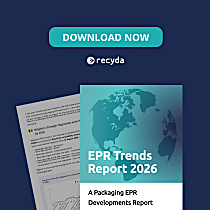Home compostable plastics are ineffective greenwashing scams, finds UK study

04 Nov 2022 --- A study reveals that the majority of “home compostable plastics” in the UK are ineffective and mislabeled, causing them to end up in landfills. According to the research, calling plastic packages “home compostable” is a greenwashing tactic designed to take advantage of consumer interest in environmental sustainability.
The study, published in the journal Frontiers in Sustainability, concludes that most home compostable plastics don’t work, with 60% failing to disintegrate after six months.
“The bottom line is that home compostable plastics don’t work. People want them to work. People are trying to do the right thing, mostly, so I feel bad for them that it has turned out this way,” says professor Mark Miodownik, an author of the paper.

“If people continue to market home compostables, it’s greenwash.”
The study found 10% of people can effectively compost at home, but for the remaining 90% of the population, the best place to dispose of compostable plastics is in landfills. “Most compostable plastics end up in landfill or are burnt,” the researchers state.
 UK study concludes home compostable systems are not an effective environmentally sustainable packaging solution.Home compost failure
UK study concludes home compostable systems are not an effective environmentally sustainable packaging solution.Home compost failure
The results were drawn from 9,700 people across the UK who completed the Big Compost Experiment survey study. Those participants were evaluated on their understanding of plastic waste, and 1,600 implemented composting systems with compostable labeled plastics at home.
Those involved were a range of composters, from indoor wormeries to outdoor trenches. They used spades, trowels and sieves to go through their compost and look for traces of plastics, recording results online.
The study measured whether something was compostable if 90% of the carbon in the materials disappeared in six months or not. According to the researchers, most plastic people put in their home compost should not be there in the first place due to incorrect or unclear labeling.
It was reported that 14% of plastic packaging items were certified “industrially compostable,” and 46% had no compostable certification. For example, packages could be labeled 100% biodegradable, which does not translate to composting, as many assume, and hinders the composting process.
“Before, it was unclear, but now we have the evidence. People are making claims for material without much understanding of what has to happen for it to actually be biodegradable,” articulates Miodownik.
The results showed no specification was reliably home-compostable. The determination is that home composting “is not at present a viable, effective or environmentally beneficial waste processing method for compostable or biodegradable plastics in the UK,” wrote the report.
Other solutions
Everyday uses for compostable plastic include food packaging, magazine wraps, bags, cups, plates and cutlery.
When compostable plastic gets into food waste, it contaminates it, blocking the recycling process and resulting in more production time, energy and waste.
“Let’s stop. Let’s not pretend to ourselves that it’s going to be some sort of panacea, and you can sell people stuff without really having the infrastructure to deal with the waste and hope that it’s all going to go away,” continues Miodownik.
The researchers state that the only ecological solution for packaging is less plastic. Researchers become disappointed by failed home compostable plastic packaging results, with 60% not degrading.
Researchers become disappointed by failed home compostable plastic packaging results, with 60% not degrading.
“The idea that a material can be [environmentally] sustainable is a widespread misconception. Only a system of production, collection, and reprocessing of a material can be [environmentally] sustainable. The type and amount of energy used to fuel the process, the water usage, and the by-products also contribute to its environmental footprint,” states the report.
Consumer insights
The study recorded the key enablers that lead people to buy products with biodegradable or compostable plastic packaging. The first was positive beliefs about biodegradable or compostable packaging’s environmental impact and the resolve to behave pro-environmentally. The other main reason was not having access to composting or compostable materials collection.
The key barriers reported included psychological capability – not understanding terminology used to label packaging, not taking notice of packaging, and preferring other types of packaging and product qualities.
Another barrier is harboring negative beliefs about the environmental impacts of biodegradable or compostable plastic packaging and skepticism over decomposition claims. Lastly, they do not have access to composting or compostable materials collection.
“Reduce and reuse are often big money savers for everyone, and yet it seems the least intuitive strategy to people,” Miodownik concludes.
By Sabine Waldeck











